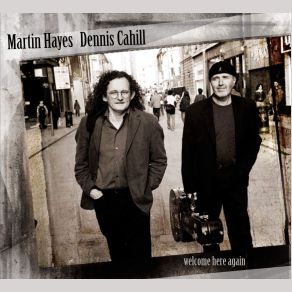Welcome Here Again
Download links and information about Welcome Here Again by Martin Hayes, Dennis Cahill. This album was released in 2008 and it belongs to World Music, Songwriter/Lyricist, Celtic genres. It contains 18 tracks with total duration of 52:50 minutes.

|
|
|---|---|
| Artist: | Martin Hayes, Dennis Cahill |
| Release date: | 2008 |
| Genre: | World Music, Songwriter/Lyricist, Celtic |
| Tracks: | 18 |
| Duration: | 52:50 |
| Buy it NOW at: | |
| Buy on iTunes $9.99 | |
Tracks
[Edit]| No. | Title | Length |
|---|---|---|
| 1. | The Clare Reel | 2:13 |
| 2. | The High Jig | 1:47 |
| 3. | Lane to the Glen / Fahy's | 2:51 |
| 4. | The Dear Irish Boy | 5:29 |
| 5. | The Night Poor Larry Was Stretched | 2:15 |
| 6. | P. Joe's Reel | 1:46 |
| 7. | An Rogaire Dubh | 3:05 |
| 8. | Jenny's Welcome to Charlie | 2:48 |
| 9. | The Girl That Broke My Heart | 2:42 |
| 10. | The Wind Swept Hill of Tulla | 4:11 |
| 11. | The Galtee Hunt | 2:17 |
| 12. | John Naughton's Green Mountain / Welcome Here Again | 2:59 |
| 13. | Mulqueen's | 1:28 |
| 14. | The Booley House Jig | 2:01 |
| 15. | O'Reilly's Greyhound / Palmer's Gate | 3:59 |
| 16. | Coleman's March | 2:32 |
| 17. | The New Post Office / The Pigeon On the Gate/ The New Custom House | 6:26 |
| 18. | Frank Keane's | 2:01 |
Details
[Edit]Over the course of his career, Hayes he been slowly stripping everything extraneous from his music. In the long, long break since his last CD, he's obviously made a lot of progress on the road, as the opening cute, "The Clare Reel," demonstrates. There's no fat here; everything serves to highlight the simple beauty of the melody, exposing and buffing it to a silky brilliance. His County Clare style isn't built for speed (although he can switch it on at times), but for a kind of meditation — Irish folk as Zen — finding the glory at the heart of a tune. At times, as with the slow air "The Dear Irish Boy" he achieves something quite remarkable, taking a piece of folk music to its core and revealing something as complex and lovely as a sonata. There are very judicious overdubs, and although Hayes is the frontman, much of the success of this record actually lies with partner Dennis Cahill. The two enjoy a symbiotic relationship by now, and Cahill exudes small touches of brilliance that enhance what Hayes does — shadowing a melody on mandolin, playing his guitar like a harp, or working harmonically around the melody to throw a fresh light on it. Even in the instances where his playing emphasizes rhythm, it's done with gentle subtlety, never detracting from the melody above. All of that serves to make an album that glistens and show just what an inventive duo they are, as well as highlight the inescapable fact that Hayes has become the leading fiddler of his generation, one who thinks about the music as much as he feels it. And Welcome Here Again might well be the finest Irish folk album in a long, long time.